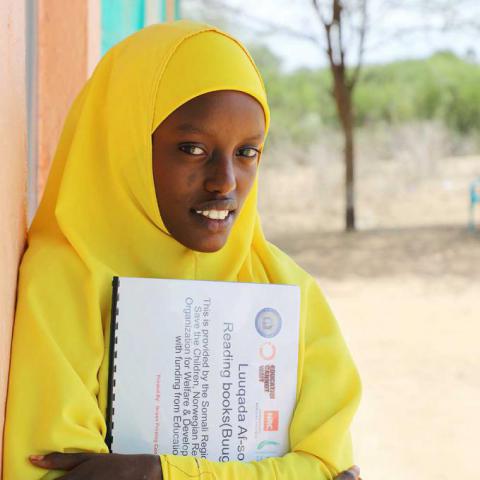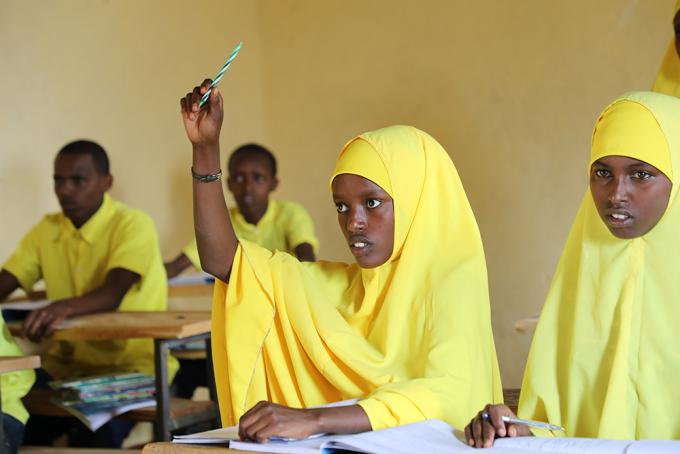Conflict Only Results In Destruction: Education for a Better Future: Hanifa’s Story

Fourteen-year-old Hanifa is an eighth-grade student in Chamuk primary school. She lives with her parents and seven siblings in an IDP site near her school in Moyale Woreda, Dawa zone, Somali region of Ethiopia.
“I like going to school because I went to acquire knowledge so I can live a good life. Both of my parents went to school and understand the benefits of education very well. They encourage me to focus on my education. My mother stays at home and my father is working at the Woreda government office. He helps me with my assignments and my studies” said Hanifa.
Hanifa is preparing for the eighth-grade national examination. She is currently attending the remedial class supported by the ECW MYRP. The remedial classes are designed for students who have missed classes due to various reasons. Also, slow-paced learners and students with low academic performance attend the remedial classes
“Last year, when my period suddenly came while I was attending class, I panicked and went home. I stayed home for more than a month because I felt humiliated. My mother advised me that I do not need to be ashamed about it as it is a natural thing for any adolescent girl.” said Hanifa.

Hanifa wishes she had the discussion with her mother or with her older sister before her period suddenly happened. She has now understood that it is important to talk about it beforehand. She says that when her younger sisters grow up, she will talk about it with them so they can prepare for it.
Last year, after Hanifa came back to school, sanitary pads were provided with the support from ECW MYRP for Hanifa and other adolescent girls in Chamuk primary school to encourage them to come to school throughout the month. Since Hanifa has missed her classes for more than a month, she is attending the remedial class since the beginning of the school break. She is catching up with the lessons she has missed from last year.
Hanifa is a member of the school reading club. She participates in Somali and English languages. ECW MYRP has provided supplementary reading books for Chamuk primary school.
“In our peer-to-peer adolescent girls learning group, we read different stories which teach about different things like friendship, tolerance and benefits of hard work. My favorite story is about valuing friendship and supporting a friend during difficult times. From the story, I have learned how rumor hurts friendship.” said Hanifa.
After school, Hanifa helps her mother with household chores such as washing dishes and cleaning the house. Hanifa’s family was displaced due to a conflict that happened three years ago. During the conflict, her parents lost everything they have including their house.
“I have witnessed the horror of conflict. When the conflict broke out in our neighborhood, we run into bushes to save our lives. That moment was very difficult for my family. My mother was very ill and had a miscarriage. At one time, we were all thirsty and forced to drink dirty water. I believe conflict should be avoided under any circumstances because it only results in destruction,” Hanifa added.

There is severe water shortage in the Chamuk community. “My sister and my mother spend long hours to fetch clean drinking water for our family. When I grow up and join university, I want to study Water Engineering to solve the water shortage for my community and my country since water is important for our survival.” says Hanifa.
Alinur Ali is Moyale Woreda’s Educational Monitoring and Evaluation Expert. “We are happy that ECW MYRP is on implementation in our Woreda. Compared to the previous years, the number of enrollment has increased in five targeted schools of the program. The school feeding program is encouraging students to come to school and reducing burdens on their families. The reading club and remedial class implemented by the support from this program is expected to boost children’s capacity. The training provided for teachers on literacy and numeracy is helping them to understand the students’ level and the required support for the students.” Said Alinur.
The Moyale Woreda works closely with ECW MYRP to conduct outreach activities, training and joint supervision on the implementation progress.
“The program has installed roof water catchment and rain harvest system with water containers. Currently, we are unable to use it due to a severe water shortage in our Woreda. Temporarily, the program is providing alternative water trucking services in the targeted schools.” said Alinur.
About the program
The Education Cannot Wait facilitated Multi-Year Resilience Program (ECW MYRP) is a three-year program aiming to improve learning through equitable access, crisis-sensitive, and quality education for emergency-affected children including children living with disabilities. The required total budget is 165 million USD with a plan to implement in Afar, Amhara, Benishangul-Gumz, Harari, Oromia, SNNP, Somali, and Tigray regions. Currently, ECW MYRP is implemented though 27 million USD seed funding from Education Cannot Wait (ECW) initially focuses interventions on addressing the critical educational needs of 60,487 out of school-displaced children in 81 schools, 17 woredas of Amhara, Oromia, and Somali regions. Part of the seed money will support efforts to mobilize the funding gap of US$138 million needed for the whole program.
Save the Children, NRC, and OWDA are implementing ECW MYRP in Fafan, Dawa, Korahey, and Liben zones of the Somali region since the program implementation started in January 2021. The following are some of the achievements of the program in the Somali region.
- Temporary learning spaces were constructed in most targeted schools.
- The school feeding program is running in most targeted schools.
- Gender segregated latrines were rehabilitated in most targeted schools.
- Roof water catchment and rain harvest system with water containers with the capacity of 10,000 liters were installed in most targeted schools.
- Psychosocial, literacy & numeracy, techniques of daily lesson planning, and supporting children living with disabilities training was provided for teachers in most targeted schools.
- Training on school hygiene and sanitation, awareness creation techniques on the benefits of education including for children living with disabilities were provided for PTA members in most targeted schools.
- Students received learning materials like exercise books, pencils, and pens in most targeted schools.
- Girls received dignity kits in most targeted schools.
- During the summer break, remedial classes were provided for selected students in most targeted schools.
- School reading clubs were established in most targeted schools to enhance the reading capacity of students.
- School WASH clubs were established to promote hygiene and sanitation in most targeted schools.
 Ethiopia
Ethiopia